The Checker Maven
The World's Most Widely Read Checkers and Draughts Publication
Bob Newell, Editor-in-Chief
Published every Saturday morning in Honolulu, Hawai`i
Noticing missing images? An explanation is here.
Labor Day 2022

Things have improved for the working person since last Labor Day. Unemployment is low and many employers are desperate to make hires. Wages are up at least a little, although inflation is a big worry and fingers crossed that there is no recession.
But we should always remember the reason for the Labor Day holiday, which is to recognize the millions of working people that have made and continue to make America a great nation. Without the hard workers who fill every conceivable kind of job and perform every conceivable type of task, where would we be? Each and every worker is important, and each and every worker deserves respect and recognition.
Checkers in the past has been thought of as the working person's mind game. We like that description. So to celebrate the day, as we always have in the past, we turn to an American problem composer, Tommie Wiswell, and a composition he calls All Around the Mulberry Bush.
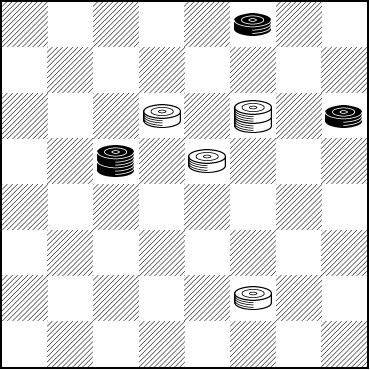
WHITE
White to Play and Win
W:W10,K11,15,27:B3,12,K14
We'll give you a small hint by saying it's the patient and careful worker that brings home the bacon. Work away at this one and see the fruits of your labor. Clicking on Read More will show you the solution.![]()
Marvin J. Mavin: A Very Large Problem

The Detroit Doublejumpers had just completed annual pre-season training camp at the appropriately named location of Au Train, Michigan. It was always a difficult time for the players, who were really put through their paces both mentally and physically, but no one more so than team Captain Marvin J. Mavin, who had to give up beer, run endless laps around the lake, and even do push-ups sometimes.

After camp the team had a traditional week off before they played some exhibition games prior to opening the regular season. It was a Saturday afternoon and Marvin was visiting with his fiancee, Priscilla Snelson, at her very large swanky new condo, one she bought after she was made CEO of Rust Belt Holdings, a position which came with a very large salary.
Priscilla and Marvin planned on a relaxing afternoon together followed by dinner at a restaurant chosen by Priscilla ... which, of course, was upscale and expensive, boasted two Michelin stars and featured a very large French menu.
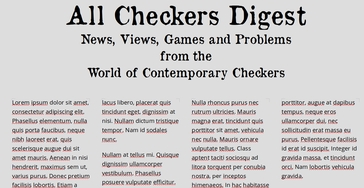
Marvin was on one of the couches in the very large living room, reading an issue of All Checkers Digest. The magazine always contained a few challenging checker problems and Marvin was just starting to really get involved with one of them.
BLACK
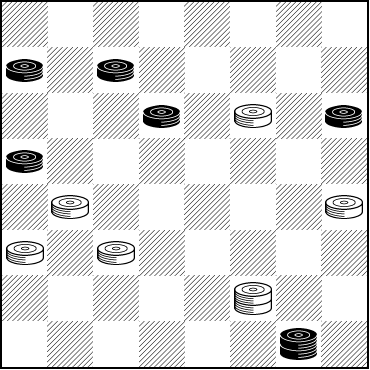
WHITE
White to Play and Win
W:W11,17,20,21,22,K27:B5,6,10,12,13,K32
"Marvin, dear!"
Priscilla's voice, sweet though it was, cut through Marvin's concentration.
"Yeah honey, what is it? Hey, by the way can you bring me a beer? I'm working on this problem ... "
The voice now took on a definite edge. "Get your own beer, dear, and while you're at it come over here. I want to show you something."

Marvin reluctantly got up and went into the very large kitchen. Priscilla was seated at the very large kitchen table with magazines of her own spread out in front of her. "What do you think about this, Marvin? It's in the latest issue of the Beautiful Blissful Bride's Best Boutique magazine ... "
"Bride's Best ... what did you call it? Bo Peep or something? Hey, anyhow, they got a checker column in that magazine?"
"Marvin, be serious!" Uh-oh. Marvin knew it was never good when Priscilla told him that. She continued, "I want to know what you think of this bride's dress for our wedding."

Now, Priscilla was planning a very large wedding. They had yet to set a date but she said it would take her at least six months, and probably a lot longer, to get everything arranged. There would be a very large guest list, a very large cocktail party, a very large dinner, and a very large send-off following a very large dance party.
Marvin, knowing that, unfortunately replied, "Gee, Prissy, the wedding ain't for probably a year yet, what's the rush? And besides I don't know nothing about wedding dresses."
"Marvin! I don't think I like your attitude. And how many times have I told you, don't call me Prissy!"
Marvin quickly backtracked. "Aw gee honey, I'm sorry. Here lemme see the dress."
Priscilla relented, but only a little. "Here you go," she said, pointing to a very large centerfold in the magazine.
"Yeah, great! Sure does look like a wedding dress, don't it? I mean, it's got all of them ruffles and stuff ... but I kinda think you don't look like ... "
Priscilla, now very angry, slammed the magazine shut. "Oh Marvin, you're so ... so ... useless! How will I ever get this wedding arranged if you don't help?"
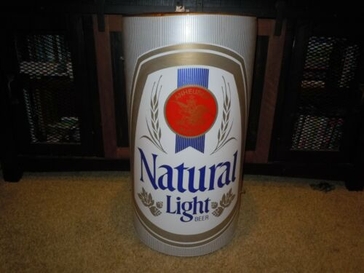
"A beer right now would help ... ' Marvin said, again unthinkingly.
Priscilla stood up, hands on hips. Once more, not a good sign. "You'll get a beer over your head!" she said. "And don't open that fridge ... or else! It's getting close to time to leave for Le Faux Luxe in any event.
Marvin, who was halfway to Priscilla's very large fridge, stopped in his tracks. "Aw, gee, Prissy, gimme a break. One beer, okay? That fancy place ain't got nothing but old wine and them funny colored cocktails."
Priscilla, still glowering, thought for a moment. "You know, Marvin, you're right. You need a beer. You don't need an elegant candlelight dinner of haute cuisine, fine wine, and superb service. So how about you take your silly checker magazine and go down the block to that bar you love so much and have a beer and a burger? You can call me in a couple of days when you've seen the light and are ready to help with the wedding."
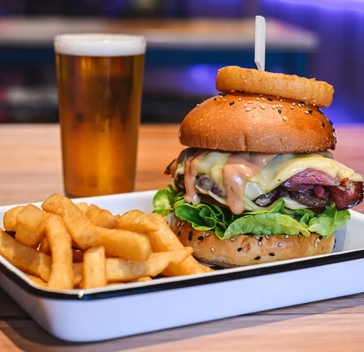
"Hey, yeah, can I have fries with ... oh, okay." He quietly picked up his All Checkers Digest, went out and took the elevator down to street level. At least he had a very large beer and a very large burger to look forward to. With fries. Of course, making up with Priscilla would be, as always, a very large problem, but he'd work it out.![]()
A Saturday in August

It was August, usually one of the hottest months of the year in Bismarck, North Dakota, and 1955 was no exception. Although North Dakota is often rightly thought of as a very cold place, summers, though brief, could be scorching hot, with temperatures above a hundred degrees on some days.
Sal Westerman, the unofficial leader of the Coffee and Cake Checkers Club, usually stayed in town during August. His wife Sylvia always went to Dickinson to spend two or three weeks with her sister, and while she was away Sal would retreat to the relative coolness of his basement to read his checker magazines and do some study from his large checkers library. The Club didn't meet during the summer, and in fact their usual venue, the Beacon Cafe, closed down in August so the proprietress, Deana, could go to Gackle to visit with family and help with the wheat harvest.

On this Saturday the temperature reached 105 degrees in the early afternoon, and Sal didn't plan to leave his basement except if absolutely necessary. There was a bathroom as well as a small refrigerator, and it was just too hot to venture into the upper floors of the house. But by later in the afternoon even the basement was just too hot. Still, there was nowhere else to go. The big floor fan was already at full blast. Nothing to do but stick it out.
Sal had been working from a new problem book that All Checkers Press had just published. Sylvia had given it to him as a birthday gift. It was a nice collection and included problems by two of his checker pen-pals, Brian and Ed.
The heat was starting to make Sal, who after all was in his seventies, a bit sleepy. Then Sal did something that he didn't do very often; he got a beer from the fridge and opened it up. Sal would have the occasional social drink but seldom anything but that. It was the heat, and he wanted something cooling. It was too hot to eat anything, but a cold drink would be nice.

Sipping his beer and working on a few problems, he suddenly became aware that the room was getting darker. Now, the basement wasn't all that large. There was the furnace, of course, a half bath, a lot of storage cabinets, a workbench, an easy chair and an old couch, and a small table in the middle served by a couple of battered kitchen chairs. There were several casement windows on the walls, up near the ceiling. There was an overhead light and a couple of floor lamps.
Now, it was odd. The lights were all on but they didn't seem to be giving off more than a faint glow. Sal looked up at the windows and it was pitch black outside. Was it storming, or had he fallen asleep and it was now well after dark? No, his beer was still cold, in fact ice cold, colder than the old fridge could have ever made it.
Sal thought he had best go upstairs and check around. That's when he got the biggest surprise of all.
There was a wall where the stairway leading upstairs used to be. Not even a new looking wall, but just a continuation of the walls in the rest of the room.
Sal started to be frightened. This just wasn't possible ... was it?

And there was an eerie silence. Not a sound came from outside. Another shock: the electric wall clock had stopped, the second hand no longer sweeping, the time 11:52. Eight minutes until midnight, Sal supposed. But if the electric clock was stopped, how could the electric lights be on, even though only barely?
Now, stay calm, Sal told himself. Sit down at the table, take a few deep breaths.
The table was gone. So were the chairs. In fact everything in the room seemed to be fading away, as if darkness were seeping in and dissolving reality.
The walls were no longer visible, nor were the floor or ceiling. Sal now felt a floating sensation, and then a breeze that turned into a wind that pushed him along in total darkness.
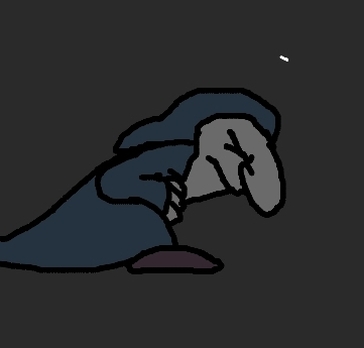
It seemed to go on forever, the wind stronger and stronger, Sal being carried faster and faster. And now along with the darkness he heard an unearthly howling that grew so loud Sal thought his ears would burst.
Suddenly it was over.

Sal was standing in a large room, in front of a long table. Everything in the room was glowing red as if on fire. Seated behind the table were Brian, Ed, and--- Sylvia! After a moment, Sylvia spoke. "You have been called before this tribunal to stand in judgment. How do you plead, guilty, or guilty?"
Sal was in shock. Finally he managed to say, "Have I died? Is this the Last Judgment? But why aren't there ... you know ... angels and ... St. Peter? And Sylvia ... why are you here?"
"Answer the question, mortal. Do you plead guilty, or guilty?" Brian said.
"Yes," added Ed, "you must plead either guilty or guilty. After all, we know you're guilty, don't we?" Ed laughed manically and the others joined in, the laughter swelling and ringing in Sal's ears.
"Guilty of what?" Sal said. "I say, not guilty of ... whatever it is!"
"Not guilty?" said Sylvia. "You must plead either guilty, or guilty! Everyone must obey! Everyone is guilty and everyone is condemned! We do not accept your plea and we find you guilty. You are hereby sentenced to ... "
Sylvia paused and waved her arms at Brian and Ed. "All together now boys, let's hear it ... "
Sal opened his eyes. His head was resting on his new problem book and he was drenched in sweat. Slowly, he raised his head and looked at the electric clock. It was nine o'clock and, glancing at the windows, he saw it was getting dark.
He must have finished all of his beer, as the bottle was empty.
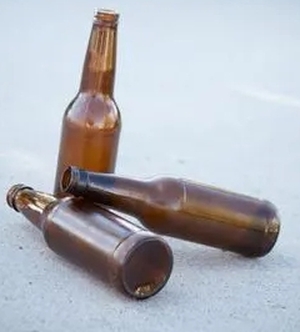
Uh-oh. There were three empty beer bottles on the table. Guilty, or guilty? Everything fell into place and Sal understood.
Sal took one last look at his checkerboard, which had the following position on it.
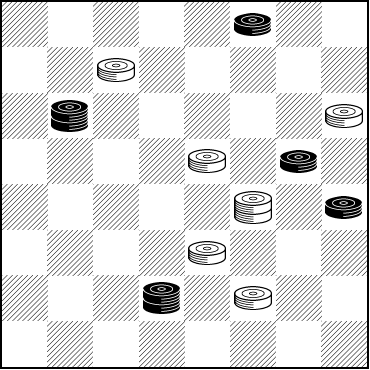
WHITE
White to Play and Win
W:B3,16,20,K9,K26:W6,12,15,23,27,K19
But he shook his head and said to himself, "Too much checkers today. Too much heat. Too much beer. Too much ..." He shook his head again. He had had a terrible dream. "Better just get to bed," he concluded, "and it sure will be nice when Sylvia--- the real-life Sylvia--- gets back home."

Sylvia Westerman
We hope you don't ever have a bad dream like Sal's. We also don't recommend three bottles of beer on an empty stomach, or at all for that matter, especially when solving checker problems. Can you solve the position shown above? Don't let it give you nightmares; you can always click on Read More to see the solution.![]()
A Good Coach

Our Checker School series has featured several problems and excerpts from Andrew J. Banks' quirky but fascinating book Checker Board Strategy, published back in 1945. Mr. Banks came up with a set of characters, such as Farmer Sneed and Skittle, whom he utilized in short sketches to illustrate various principles related to learning the game of checkers.
Here's a short sketch Mr. Banks entitled A Good Coach.
A Good Coach
Said Aristotle, "The one exclusive sign of a thorough knowledge is the power of teaching." The popular Internationalist, has this power. He usually preferred to demonstrate problems, rather than games. In studying a game is not the student tempted to merely guess at the reasons for the moves? However, in solving a problem, he must think accurately. The Internationalist, without using a board, often solved all the problems in an issue of Wood's Checker Player. With amazing speed, he solved gems that players set up for him; he has mastered over 25,000 problems. Moreover, his teaching ability equaled his great skill.
His method was to tactfully indicate where and why Skittle had failed to solve a problem. Skittle's second attempt consequently was superior to the first; whereupon the Internationalist warmly congratulated him; and this made Skittle energetically try to solve more problems. Encouragement does not make a pupil wiser, but it does enable him to endure correction. Said Mr. Johnson, "The applause of a single human being is of great consequence."
What Skittle learned served him well; he felt that his play was his own---not his teacher's. He received excellent advice and theories, but no set rules. There are no formulas in checker playing---each player must develop his own style. He should remember that study and copy are two different things.
Skittle developed the feel of the game, an observing eye, and new exciting ideas. How did he learn so rapidly? He made mistakes, corrected them; made more, corrected THEM; and repeated this process over and over. Great things are performed not by strength but by perseverence.
In the story, Mr. Banks refers to the "Internationalist." There are several players who were called that. We're not sure who he means. We think it might be Harry Moulding, but we don't know for sure. Can any of our readers shed some light on this?
In any event, here's the problem Mr. Banks provided to go with his little tale.
WHITE
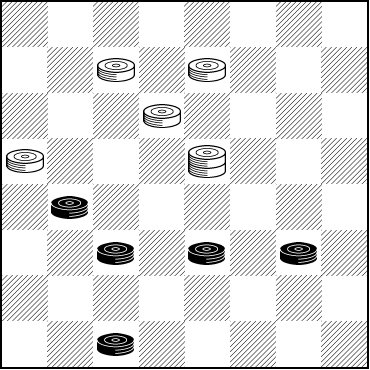
BLACK
Black to Play and Win
B:WK18,20,23,26,27:B3,9,10,11,16
Depending on your skill level, you might need a little coaching on this one. It's quite clever and pleasing. See how you do and then coach your mouse over to Read More to see the solution.![]()
Easy As Pie
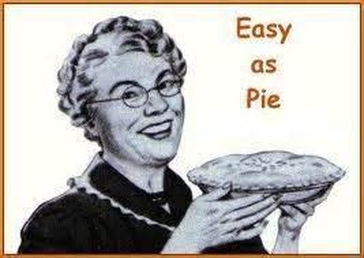
We've all heard the expression "easy as pie" to refer to something that is indeed very easy. But finding the origins of this expression is not quite as easy as pie.
There are a couple of theories. In 1855 the expression "nice as pie" appeared in print. In 1884 Mark Twain wrote "polite as pie." In 1886 "it's like eating pie" was found in Sporting Life. Finally in 1887 we see "it's as easy as pie" in the Newport Mercury.
Another idea traces back to pre-Reformation England, when the rules for computing the date of Easter were called "Pie." The theory goes on to speculate from the context that "Pie" originally meant something overly complicated and morphed into something that was in fact very easy. This seems a bit of a stretch.
And the most unusual idea of all relates the expression to the Maori word "pai" which means "good" and perhaps led to the Australian expression, in the 1920s, "pie at" or "'pie on" which meant "to be good at something" which was itself perhaps "easy as pie." This also seems a bit contrived.
We'll go with the explanations from the 1800s, and present a speed problem which is indeed as easy as pie.
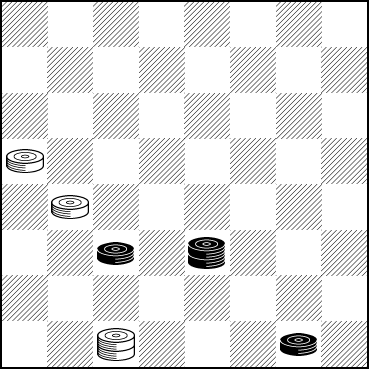
BLACK
Black to Play and Win
B:W20,16,K3:B11,1,K10
Most players will solve this instantly. See if you solve it at first glance. Novices may have to think a bit but also should be able to get it. No matter your status, treat yourself to a piece of pie after you've verified your solution by clicking on Read More.![]()
December Downtime

We anticipate The Checker Maven website being down or inoperable during the period of December 26 to December 30, 2022, as we convert the site from HTTP to HTTPS.
The conversion is long overdue. Some web browsers are starting to block access to HTTP sites for security reasons, and this practice will likely become universal before long.
Please be patient and accept our apologies for any inconvenience. We'll post more about this as we get close to the planned dates.![]()
Joe Schwartz Reflects on Checkers Experiences
A Guest Column by Dr. Richard Beckwith
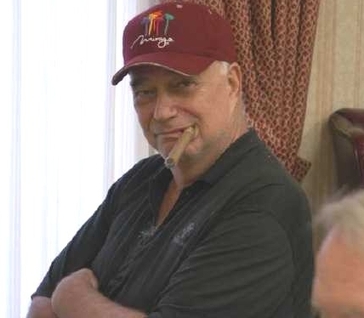
Joe Schwartz (circa 2003)
Joe Schwartz has been on the checker scene for decades. In addition to always having plenty of stories to tell, Joe interacted with many of the checker greats of the past. For example, Joe's father even once arranged a checker lesson for Joe from the great Willie Ryan, who was from Bronx, NY at the time. Mr. Ryan explained to a young Joe why certain moves were made in various openings. Willie Ryan had come down for a day to put on an exhibition at the YMCA. Joe has a picture of this day (with him in it) hanging in his home. Men typically wore suits and neckties in those days.
In the 8th International Match Book, Joe mentioned one of his biggest thrills was winning his first tournament as a teenager in Poughkeepsie, NY, the city where Joe was born. There were about 30 players, and Joe was the youngest. Joe only played GAYP back in those days, as there wasn't any three-move restriction activity around him until later in life.
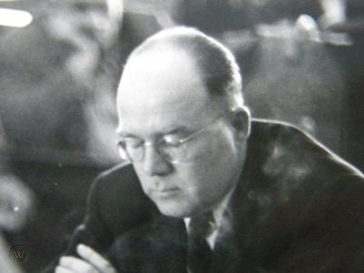
Tom Wiswell
Tom Wiswell lived in Brooklyn. Wiswell came to an exhibition for chess and checkers, where Joe got a book from him. Joe last saw Wiswell at central Park. Tom Wiswell once commented to Joe that the checker position looks different if you get up from your chair and go look at the board from the other side. Joe also mentioned that New York City had a checkers academy on 42nd street where good players met to play for money.

Richard Hallett
A checker friend Bill Wallace was with Joe during a Florida break and took Joe to a park, some 50 years ago. This is where Joe encountered Richard Hallett again. (Mr. Hallett also lived in Poughkeepsie, NY and fed Joe's cat whenever Joe was away. Later in life, Richard lived in Joe's Florida residence high-rise building.) The three players drove together to the St. Petersburg tournament, where Joe first met Marion Tinsley. Joe asked Tinsley his opinion of what is the better defensive move in the Switcher: 30-25 or 17-14 (from the run-up of 11-15 21-17 9-13 25-21 8-11 and now white to play). Tinsley replied, "30-25 is the better move."
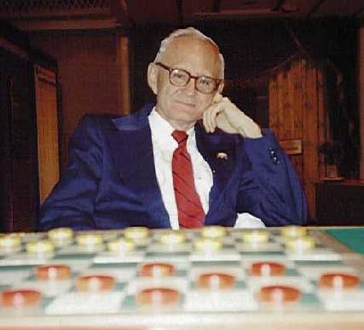
Marion Tinsley
Joe Schwartz moved to Florida in 1991, living with Bill Wallace a few months before locating to Hallandale, Florida (still his place of residence today). Joe's tradition of housing visiting checker players for the night goes back to his New York days, where he hosted the likes of Norm Wexler, Ed Bruch and Harold Freyer. Over the years, Joe sponsored matches between Richard Hallett with both Derek Oldbury and with Elbert Lowder, putting up Lowder and Oldbury (in wheelchair) for the match duration. Joe recalls Derek Oldbury being a very intellectual man who liked classical music, but was not into watching television. His wife Joan was also in a wheelchair.
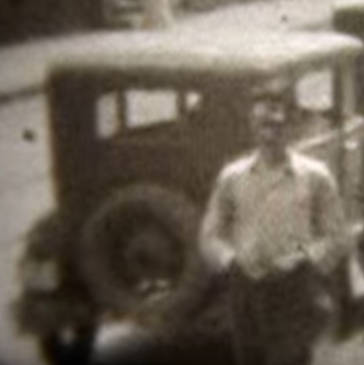
Harold Freyer
Harold Freyer once lost a game to Bill Levine at a tournament in Joe's home. In the second game, Freyer eagerly sought revenge and had Levine in a troublesome ending. Mr. Freyer suggested to his opponent that he resign the position in view of the caliber of his opponent. Bill Levine grabbed a pencil, pointed it at Harold, and said, "I have a right to play this game out." Harold snatched the pencil out of his hand. Tempers started to flare, and Joe had to come over to diffuse the situation. Harold shot back at Joe, "I've been thrown out of better houses than yours!"
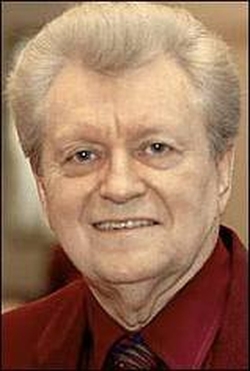
Charles Walker
Joe recalls two other incidents that led to checkers flying off the board. One was Al DuBois vs. Charles Walker. After some apparent ribbing, Mr. Dubois threw the checkers, one of which hit Mr. Walker's wife around the eye and required medical attention. The other was the last game of the National Tournament between Elbert Lowder and Ron King. Elbert appeared to have the tournament won with an apparent even ending on the last game of the tournament that most players would quickly call a draw. But Suki, needing a win, wanted to play the position out further. After some fast moving, Elbert allowed a trade that allowed his remaining pieces to get trapped with the move, which resulted in checkers flying across the table. A position on a nearby non-Master game was disturbed, and they weren't recording their moves to allow reconstruction of their position.
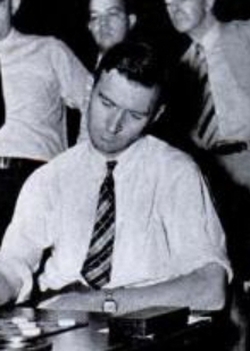
Asa Long
In additional to having several lunches with Marion Tinsley, Joe had dinner with Asa Long ("a very humble man") and even helped take Mr. Long to the hospital after his health issue that occurred shortly after the start of the 1988 U.S. National in Danville, Virginia.
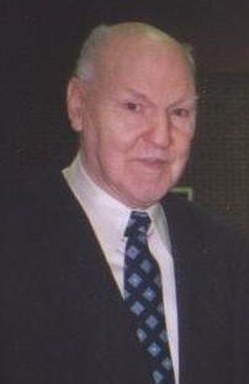
Elbert Lowder
One time Joe Schwartz was playing Elbert Lowder in a tournament on a Single Corner opening. Joe encountered some difficulty with his current game and remarked to Elbert, "I wish I had time to analyze this position." Mr. Lowder proceeded to grab the analog time clock and wound it back to give Joe an additional 30 minutes! Joe concluded the story with, "Lowder beat me anyway."
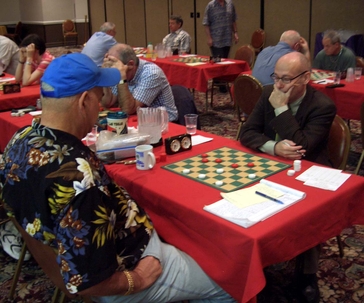
Dave Harwood and Joe Schwartz
2005 USA-UK/Ireland Match
So, what was Joe's other greatest checker thrill? It occurred in one of Joe's favorite cities to visit --- Las Vegas. This personal achievement came at the 2005 USA-U.K. & Ireland International Match held in Las Vegas, where Joe had the best record of anyone present with 10 wins, no losses and 10 draws.
BLACK
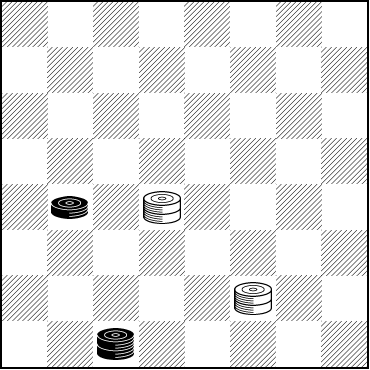
WHITE
White to Play and Win
W:WK18,K27:B17,K30
In addition, here's a problem position arising from one of Joe's games in the aforementioned 2005 match.
Game from 2005 USA vs. U.K & Ireland 8th International Match, Las Vegas
Black: Joe Schwartz
White: Garrett Owens
11-15 21-17 8-11 17-13 9-14 25-21 11-16 29-25 16-20 24-19 15x24 28x19 4-8 22-17 14-18 23x14 8-11 26-23 11-15 25-22 15x24 22-18---A,B 24-28 (see diagram below).
A---While this move does draw, 30-25 is the computer's choice.
B---32-28 loses. Try it out!
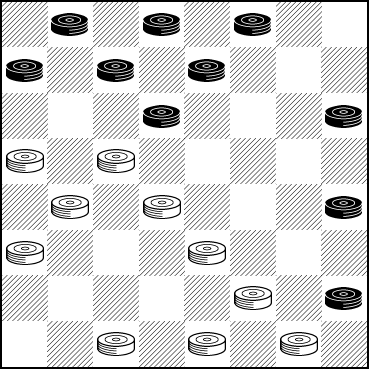
WHITE
White to Play and Draw
W:W13,14,17,18,21,23,27,30,31,32:B1,2,3,5,6,7,10,12,20,28
As always, you can click on Read More to check your solutions to these problems.
The Checker Maven extends its warmest thanks to Richard Beckwith for providing us with this fascinating article.
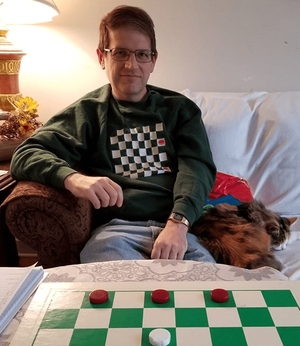
Dr. Richard Beckwith
![]()
Problem Composing Contest 63: Mystery Theme
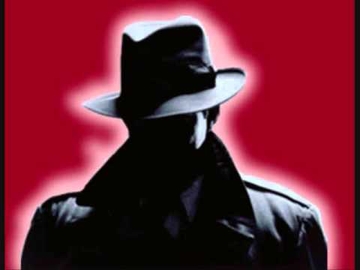
Who doesn't love a good mystery? Who, at one time or other hasn't fancied being a detective and coming up with the cleverly hidden solution to some heinous crime?
Today we're pleased to present a very special entry in Mr. Bill Salot's long-running series of outstanding checker problem composition contests, a series he calls the Unofficial World Championship. Each contest has featured a theme, but today, we're not revealing what it might be. It's a "mystery" theme. Can you solve all the problems and figure out the theme? Thankfully, no terrible crime has taken place but the mystery is nonetheless intriguing, fascinating, and perhaps even worthy of Mortimer Holmes himself (as featured in our series, The Checker Murders)!
To start you out, here's an example. Willie Ryan wrote that this problem, published by George H. Slocum in 1894, was "one of the most exquisite stroke problems on the record." The problems entered in Contest 63 demonstrate some of the same characteristics.
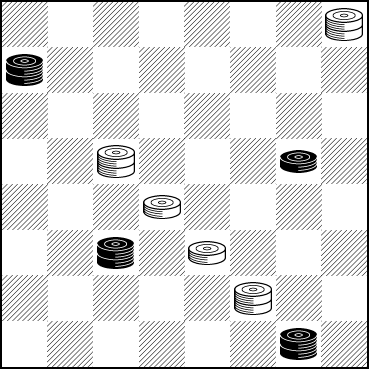
WHITE
White to Play and Win
W:WK4,K14,18,23,K27:BK5,16,K22,K32
Can you get it? You can always click on Read More to see the solution, but we won't give away the Mystery Theme. Be sure to go to the contest page to find our three challenging contest problems. Don't forget to cast your vote for the one you like best.![]()
Gone Fishing: A Beacon Cafe Story
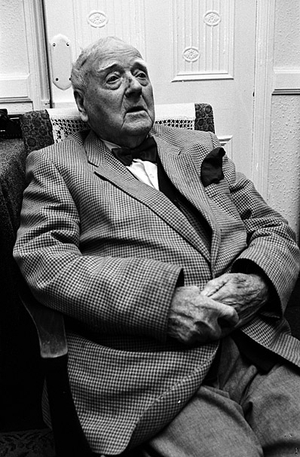
Sal Westerman
Sal Westerman, of Bismarck, North Dakota, was doing what he did every summer.
It was July of 1955 and Sal and his wife, Sylvia, were spending a couple of weeks at a lakeside cabin near Lake Sakakawea. For years they had rented the same cabin for the same two weeks.

Sal of course missed his Saturday afternoon visits to the Beacon Cafe in Bismarck, where his Coffee and Cake Checker Club met weekly during fall, winter, and spring. But like most such things in North Dakota, there was a pause to enjoy the all-too brief summer season, and the club wouldn't meet again until the Saturday after Labor Day.
At the lake, Sal and Sylvia didn't follow any particular schedule. They went to bed when they were tired, got up when they were ready, went on walks, relaxed on the porch, and just took it easy. Sal, of course, brought along some checker magazines.
This morning, however, Sal decided to take a rowboat out on the lake and try some fishing. At least, that's what he called it. What he actually did was row the boat out a ways, drop a line in the water, and then get out a checker magazine. If a fish bit that was fine but he really didn't care. Sylvia, of course, always hoped he'd catch something to cook for dinner, but she knew Sal's habits and tricks and didn't count on anything.

It was a clear and sunny morning, and it was going to be hot, so Sal knew he should go out early. The fish wouldn't really be biting once the temperature rose, but worst of all was that it would be just too warm out in the sun to focus on his magazine. So Sal rowed out at 7 AM right after an early breakfast.
"Good luck, dear," Sylvia had said, not failing to notice the copy of All Checkers Digest in Sal's tackle box.

It was still nice and cool when Sal put a lure on his hook and cast out his line. Then with a smile of anticipation, he opened up his magazine. Sal loved all the news, features, and analyzed games from professional play, but he especially enjoyed the checker problems, and this issue featured one by his friend Ed from Pennsylvania. Opening up the magazine, he quickly found the problem and was soon absorbed in trying to work out the solution.
Ed Atkinson
BLACK
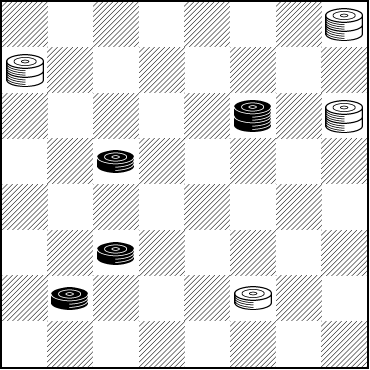
WHITE
White to Play and Win
W:WK4,K5,K12,27:BK11,14,22,25
He was deep in thought when he heard the line on his fishing reel start to run out at a rapid pace. There was a fish on his hook and it must have been a big one!

He set his magazine down on the seat beside him and took his pole from its holder. The fish was still running out as his started to crank on his reel, trying to pull it back in. It was a back and forth tussle and after about five minutes both the fish and Sal were starting to tire. Slowly but surely, Sal was making headway, pulling the fish closer and closer. Soon he could see the fish almost next to the boat, near the surface of the water. Now, where was that fish net ...
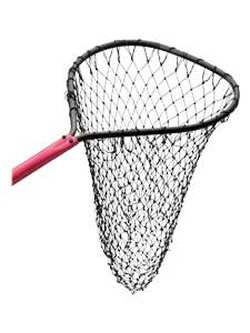
While still holding his pole with one hand, Sal reached down and grabbed the handle of his net. He pulled it up ... and wouldn't you know it but the end of the net hit his checker magazine and knocked it into the water!

Sal dropped his pole into the boat and reached out with his net to try to catch his magazine, which was slowly starting to sink. Completely forgetting about the fish, he went desperately for the magazine, but it was too late. The magazine had sunk out of reach. For a moment Sal thought about diving into the water after it, but at 73 years old diving into cold lake water wouldn't have been a good idea, and if he caught a cold from it he'd get the dickens from Sylvia.
Finally remembering the fish, he turned to the other side of the boat. But by this time, it seemed, the fish had somehow wriggled off the hook and was gone.
Despondent, Sal rowed back to shore, moored the boat, and went back into the cabin.
Sylvia was at the kitchen table doing a crossword puzzle. "Back so soon, dear? Any luck?"

Sylvia Westerman
Sal slowly recounted the story of the big one that got away, and the lost copy of All Checkers Digest.
"Oh, Sal, I'm so sorry you lost the fish. It would have made such a nice dinner. And the magazine, too, although I know you brought along several others."
"Yes, I did," Sal replied, "but this was the latest issue, and I was just starting to make progress on this problem by Ed ... "
"It's a shame, dear, but I'll make you a nice dinner tonight and you'll feel better about everything, I'm sure. How about a macaroni and hamburger hot dish?" Sylvia knew that was one of Sal's favorites, and she spiced it up with some tangy cheese.
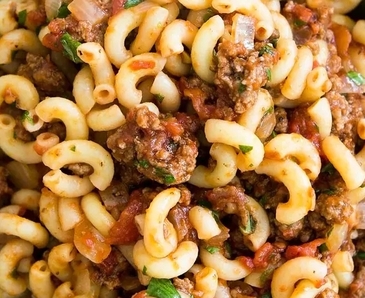
"Oh, yes, dear, thank you, that would be wonderful." But Sal still looked despondent.
It was about time for lunch and they had a ham sandwich with some canned tomato soup. Sal then announced he would take a short rest and Sylvia said she would need to drive into town to pick up some ground beef and a package of macaroni for tonight's dinner.
After washing dishes, Sal lay down while Sylvia headed off for town. Sal awoke an hour or so later and Sylvia was just coming back into the cabin with a bag of groceries.

"Unpack for me, will you Sal, while I freshen up a little. It's so hot out now!" Sylvia said, placing the bag on the kitchen table.
"Sure," Sal said.
Macaroni went into the cupboards, ground beef into the refrigerator, and so on. "Quite a lot of groceries," Sal remarked, but got no reply.
Wait ... what was that in the bottom of the brown paper shopping bag?
No, it couldn't be. Sal had to look twice, then a third time. Slowly, he took the item out, looking at it in wonder.
"Surprised, dear?" Sylvia asked, now standing at the dining table.
"My goodness," Sal said, "how did you do it?"
"Oh, it wasn't hard. It's a pretty popular item, after all. Just about everyone carries it."
Sal smiled as he looked lovingly first at his wife, and then at the copy of the latest issue of All Checkers Digest that he held in his hands.

It looks as though Sal is going to get to try to solve that special problem after all, and of course you can, too. After you've tried it, though, there's no need to go fishing for the solution; just cast your mouse on Read More to see how it's done.![]()
PS-I or I-PS
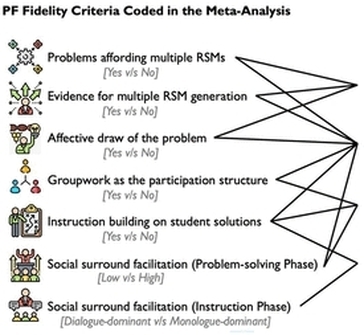
In today's Checker School column, we're going full-bore academic. Here's the abstract from a recent paper entitled When Problem Solving Followed by Instruction Works: Evidence for Productive Failure by Tanmay Sinha and Manu Kapur.
"When learning a new concept, should students engage in problem solving followed by instruction (PS-I) or instruction followed by problem solving (I-PS)? Noting that there is a passionate debate about the design of initial learning, we report evidence from a meta-analysis of 53 studies with 166 comparisons that compared PS-I with I-PS design. Our results showed a significant, moderate effect in favor of PS-I (Hedge's g 0.36 [95% confidence interval 0.20; 0.51]). The effects were even stronger (Hedge's g ranging between 0.37 and 0.58) when PS-I was implemented with high fidelity to the principles of Productive Failure (PF), a subset variant of PS-I design. Students' grade level, intervention time span, and its (quasi-)experimental nature contributed to the efficacy of PS-I over I-PS designs. Contrasting trends were, however, observed for younger age learners (second to fifth graders) and for the learning of domain-general skills, for which effect sizes favored I-PS. Overall, an estimation of true effect sizes after accounting for publication bias suggested a strong effect size favoring PS-I (Hedge's g 0.87)."
If you managed to follow all of that, you might wish to seek out the full paper, which is easily found on-line and is freely available. But what's this got to do with our game of checkers?
As it turns out, quite a bit. Should we study a concept in a checker book (like, for instance, fourth position) and then solve problems based on that theme? Or should we try some problems first, likely encountering failure, and only then go back and study the tutorial material? The paper suggests the latter for all but the youngest age groups.
Well, then, let's put this into practice, shall we? Here's a problem from Richard Pask's best-selling (in checker book terms, at least) Checkers for the Novice. If you're an expert player, you'll find the problem easy and you won't need the instruction. But for the rest of us --- what learning method will work best?
Choose your approach. See what resonates with you. You can actually experiment with the entire book, if you wish.
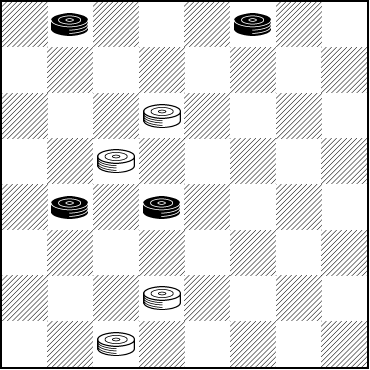
WHITE
White to Play and Win
W:W10,14,26,30:B1,3,17,18
We won't give the solution here; it's Diagram 57, part of Lesson 11 in Mr. Pask's book. If by any chance you don't have a copy, it's a free download.
So, what method did you choose? What was the easiest way for you to learn the concept demonstrated in this problem? Book first? Problem first? Do let us know what you think.![]()
The Checker Maven is produced at editorial offices in Honolulu, Hawai`i, as a completely non-commercial public service from which no income is obtained or sought. Original material is Copyright © 2004-2025 Avi Gobbler Publishing. Other material is public domain, AI generated, as attributed, or licensed under CC1, CC2,CC3 or CC4. Information presented on this site is offered as-is, at no cost, and bears no express or implied warranty as to accuracy or usability. You agree that you use such information entirely at your own risk. No liabilities of any kind under any legal theory whatsoever are accepted. The Checker Maven is dedicated to the memory of Mr. Bob Newell, Sr.

